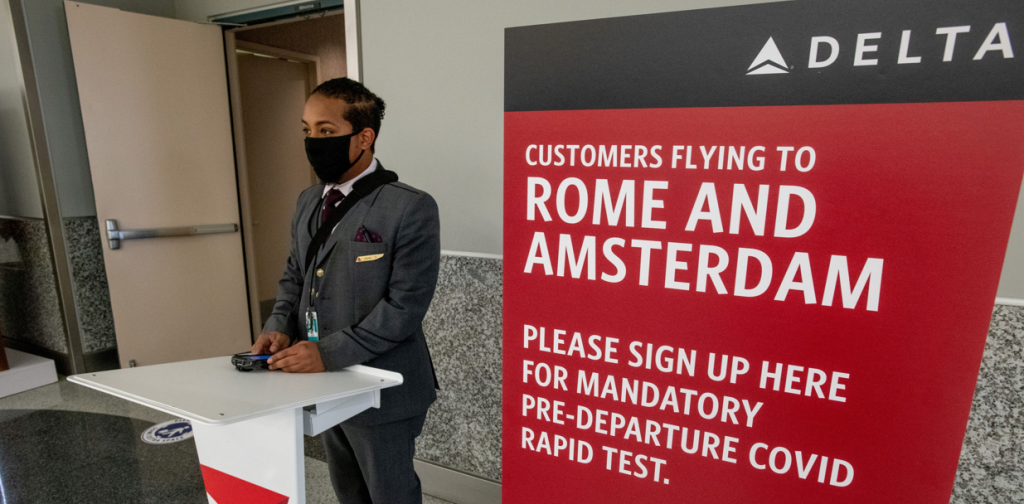These findings are not based on computer simulations or expert projections but from a unique study that examined real-world customer data on Delta's COVID-tested trans-Atlantic flight corridors between New York, Atlanta and Rome's Fiumicino International Airport in Italy.
The now peer-reviewed study, conducted in conjunction with Georgia Department of Health, has been published in Mayo Clinic Proceedings and showed a single COVID-19 molecular test performed within 72 hours of departure could decrease the rate of people actively infected onboard a commercial aircraft to a level that is significantly below active community infection rates.
For example, when the average community infection rate was at 1.1% - or about one in 100 people - infection rates on COVID-19-tested flights were 0.05% or 5 in 10,000 passengers.

"We are going to live with COVID-19 variants for some time. This real-world data - not simulation models - is what governments around the world can use as a blueprint for requiring vaccinations and testing instead of quarantines to re-open borders for international travel," explains Dr Henry Ting, Delta's chief health officer.
Air travel risk varies considerably depending on case rates and vaccination rates at the origin and destination, masking and other factors, but the data collected from this study show that the routine use of a single molecular test within 72 hours before international travel for unvaccinated individuals "significantly mitigates the risk of COVID-19 exposure and transmission during airline travel," according to the health expert.
In fact, other factors reduce the risk of infection still further and these numbers will improve further as vaccination rates increase and new cases decrease worldwide. "When you couple the extremely low infection rate on board a COVID-19-tested flight with the layers of protection on board including mandatory masking and hospital-grade air filtration, the risk of transmission is less than one in one million between the United States and the United Kingdom, for example," says Dr Ting.
The study began in Dec-2020 with the trans-Atlantic COVID-19 testing programme that enabled quarantine-free entry into Italy and allowed teams to review and model various testing strategies for feasibility, false-positive rates and case detection rates. Now, the results of this study are available - offering unique data insights on the risk of SARS-CoV-2 exposure, infection rates on board and showing the feasibility of putting in place a testing protocol with meaningful impact, according to the partners in the study.
Among the 9,853 potential passengers who underwent testing in the US, just four (0.04%) individuals tested positive by both the rapid antigen and confirmatory molecular tests. These individuals who tested positive by both the rapid antigen and confirmatory molecular tests were considered "true positives" and were therefore not allowed to board flights. Testing on arrival in Italy did identify a single (0.01%) additional infected individual, highlighting that while the risk may be significantly reduced, it can never be eradicated.

Dr Henry Ting, Chief Health Officer, Delta Air Lines
"The data collected from this study shows that the routine use of a single molecular test within 72 hours before international travel for unvaccinated individuals significantly mitigates the risk of COVID-19 exposure and transmission during airline travel."
In the longer-run, vaccinations will further reduce the risk of serious infection. "We believe in the importance of vaccinations to save lives," says Dr Ting. "At Delta Air Lines, our approach to this has been a marathon, and we realise that this is not a rush to any finish line - that this is a long game." The airline has implemented initiatives and programmes to strongly encourage its employees to get vaccinated.
By making vaccinations readily available and putting in place financial incentives such as an additional day of paid time off and USD100 in health rewards, Delta was able to vaccinate nearly 70% of its employees by Jun-2021. Through an employee lottery that gave over USD1 million to vaccinated employees, Delta further increased its employee vaccination rate to 74%.
With the announcement of a healthcare surcharge starting 01-Nov-2021 and testing requirements beginning for unvaccinated employees, Delta has now seen an increase in its vaccination rate to 79%. In addition, the airline has been requiring vaccination for all new employees as of mid-May-2021. "We've seen no drop off in people willing to join us," says Dr Ting.
The remaining 20,000 unvaccinated Delta employees are made up of a large portion of people who are deciding on their own timeline after they've gathered information they feel that they need, according to Dr Ting. "To all those people, I'm trying to continue to educate, advocate and communicate with them about the importance of the vaccination and accelerate their timeline."